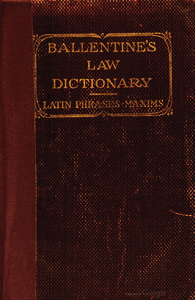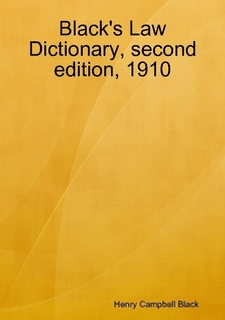The answer of a jury given to the court concerning the matters of fact committed to them for trial. See 41 N. J. L. 55. See, also, General verdict; Special verdict.
Definition of Verdict
-
Ballentine's Law Dictionary
-
Black's Law Dictionary: 2nd Edition
In practice. The formal and unanimous decision or finding of a jury, impaneled and sworn for the trial of a cause, upon the matters or questions duly submitted to them upon the trial. The word "verdict" has a well-defined signification in law. It means the decision of a jury, and it never means the decision ot a court or a referee or a commissioner. In common language, the word "verdict" is sometimes used in a more extended sense, but in law it is always used to mean the decision of a jury; and we must suppose that the legislature intended to use the word as it is used in law. Kerner v. Petigo, 25 Kan. 656.
—Adverse verdict. Where a party, appealing from an allowance of damages by commissioners, recovers a verdict in his favor, but for a less amount of damages than had been originally allowed, such verdict is adverse to him, within the meaning of his undertaking to pay costs if the verdict should be adverse to him. Hamblin v. Barnstable County, 16 Gray (Mass.) 256.
— False verdict. An untrue verdict Formerly, if a jury gave a false verdict, the party injured by it might sue out and prosecute a writ of attaint against them, either at common law or on the stafute 11 Hen. VII. c. 24, at his election, for the purpose of reversing the judgment and punishing the jury for their verdict; but not where the jury erred merely in point of law, if they found according to the judge's direction. The practice of setting aside verdicts and granting new trials, however, so superseded the use of attaints that there is no instance of one to be found in the books of reports later than in the time of Elizabeth, and it was altogether abolished by 6 Geo. IV. c. 50, § 60. Wbarton.
—General verdict. A verdict whereby the jury find either for the plaintiff or for the defendant in general terms; the ordinary form of a verdict Glenn v. Sumner, 132 U. S. 152, 10 Sup. CL 41, 33 In Ed. 301; Settle v. Alison, 8 Ga. 201, 52 Am. Dec. 393; Childs v. Carpenter, 87 Me. 114, 32 Atl. 780,
—Open verdict. A verdict of a coroner's jury which finds that the subject "came to his death by means to the jury unknown," or "came to his death at the hands of a person or persons to the jury unknown." that is, one which leaves open either the question whether any crime was committed or the identity of the criminni.
—Partial verdict. In criminal law, a verdict by which tin jury acquit the defendant os to a part of the accusation and find him guilty os to the residue. State v. McGee, 55 S. C. 247, 33 S. E. 353, 74 Am. St Rep. 741; U. S. v. Watkins, 28 Fed. Cas. 419.
—Privy verdict. One given after the judge has left or adjourned the court, and the jury, being agreed, in older to be delivered from thear confinement, obtain leave to give their verdict privily to the judge out of court. Such a verdict is of no force uniess afterwards affirmed by a public verdict given openly in court. This practice is now superseded by that of rendering a sealed verdict. See Young v. Seymour, 4 Neb. 89.
—Publio verdict. A verdict openly delivered by the j'ury in court. Withee v. Rowe, 45 Me. 571.
—Quotient verdict. A money verdict the amount of which is fixed by the following process: Each juror writes down the sum he wishes to award by the verdict, and these amounts are all added together, and the total is divided by twelve, (the number of jurors,) and the quotient stands as the verdict of the jury by their agreement. See Hamilton v. Owego Water Works, 22 App. Div. 573, 48 N. Y. Supp. 106; Moses v. Railroad Co., 3 Misc. Rep. 322, 23 N. Y. Supp. 23.
—Sealed verdict. See Sealed.
—Special verdict. A special finding of the facte of a case by a jury, leaving to the court the application of the law to the facte thus found. 1 Archb. Pr. K. B. 213; 3 Bl. Comm. 377; Statler v. U. S., 157 U. S. 277, 15 Sup. Ch 616, 39 L. Ed. 700; Day v. Webb, 28 Co.nn. 144 ; Wallingford v. Dunlap. 14 Pa. 32: McCormick v. Royal Ins. Co., 163 Pa. 184, 29 Atl. 747.
—Verdict subject to opinion of conrt. A verdict returned by the jury, the entry of judgment upon which is subject to the determination of points of law reserved by the court upon the trial.

